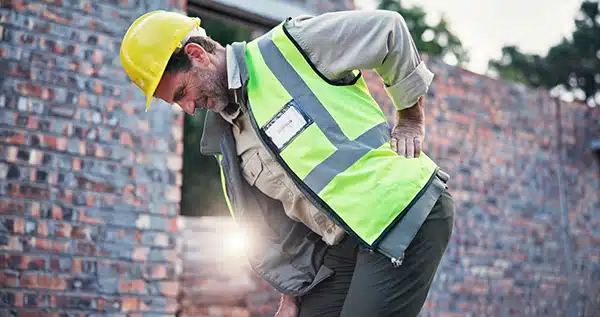
A Guide to CO Workers’ Comp Benefits for Spinal Cord, Neck & Back Injuries
“I hurt my back at work. What are my rights?”
Key points about Colorado workers’ comp claims for back and neck injuries:
- Colorado employees may be entitled to workers’ comp benefits after a neck or back injury at work even if they are able to continue working in some capacity.
- A pre-existing condition does not disqualify a worker from receiving workers’ comp benefits as long as the new injury makes the condition worse.
- Workers’ comp claims for back and neck injuries are commonly denied by insurers, but many workers ultimately receive benefits after appealing.
Back and neck injuries are some of the most common—and most misunderstood—workplace injuries in Colorado. Whether you work in a hospital, a factory, a hotel, or behind the wheel, your job can take a serious toll on your spine. These injuries may not always be visible, but they can cause long-term pain, missed work, and major medical bills.
In this article, we’ll discuss common back and neck injuries at work, which workers are most at risk, and your rights to benefits under Colorado’s workers’ comp system.
If you’re struggling to get the compensation you’re owed after a back, neck, or spinal cord injury at work in Colorado, schedule a free consultation with the knowledgeable Denver work injury attorneys at Babcock Tucker.
How common are work-related back injuries?
Musculoskeletal disorders (MSDs) like back and neck injuries are some of the most common and costly injuries in the workplace.
According to the National Safety Council, between 2021 and 2022 alone, there were 502,380 cases of work-related MSDs that led to days off work in the U.S. Of those, approximately 38.5% were neck and back injuries.
That means that in a span of just 2 years, U.S. workers suffered nearly 200,000 work-related neck and back injuries that were serious enough to make them miss work.
Which workers are most at risk for back and neck injuries?
Any workers whose jobs involve heavy lifting, repetitive motion, or sustained postures are at risk for back and neck injuries at work.
According to data from the U.S. Bureau of Labor Statistics, nursing assistants, store clerks, and warehouse workers are most at risk for these types of injuries.
Other high-risk occupations for work-related back, neck, and spinal cord injuries include:
- Janitors and other workers in the cleaning industry
- Freight workers, truck drivers, and delivery drivers
- Laborers like construction workers, landscapers, roofers, and farmworkers
- Maintenance and repair workers
- Movers
Workers in physically demanding jobs face a much higher risk of serious back and neck injuries—and the reasons are as varied as the roles themselves.
For example, health care workers need to frequently lift and turn patients, often without adequate support. Meanwhile, truck drivers and delivery workers have to endure hours of intense vibration and long stretches of sitting without breaks.
Even standing still can take a toll—especially for store clerks or maintenance workers stuck in one position for too long.
Whether it’s repetitive motion, poor ergonomics, or a lack of safety training, these risk factors add up fast, making workers in these fields far more likely to develop chronic pain and other serious back, neck, and spinal cord damage.
What are the most common back and neck injuries at work?
Some of the most common types of back and neck injuries that workers can suffer on the job include:
- Muscle strains and sprains. Often caused by overexertion, poor lifting techniques, or repetitive movements.
- Whiplash. Common after falls or vehicle accidents, whiplash is a neck injury caused by sudden jerking movements.
- Fractured vertebrae. These spinal fractures can result from falls, crush injuries, or severe trauma.
- Facet joint injuries. These occur when joints in the spine can become irritated or inflamed from wear and tear over time, limiting motion and causing pain.
- Pinched or damaged nerves. Often linked to disc problems or inflammation, these can cause pain, tingling, or weakness in the limbs.
- Herniated or bulging discs. When spinal discs shift or rupture, they can press on nerves and cause serious pain.
- Soft tissue tears. Ligaments and tendons in the neck or back can be overstretched or torn, especially during sudden movements.
- Spinal cord injuries. Among the most severe back and neck injuries, injuries to the spinal cord can lead to lasting mobility issues or even paralysis.
Keep in mind that even less serious back and neck injuries can become chronic if ignored, so early treatment is often key to protecting a worker’s health and career.
The CO Workers’ Comp Claim Process: From Initial Filing to Appeal
Learn the steps to successfully file a workers’ comp claim in Colorado and how to appeal a denied claim.
What are my rights after a back or neck injury at work in Colorado?
If you injure your neck or back at work in Denver, you have certain rights under Colorado’s workers’ compensation law that your employer or their insurer may not want you to know.
Below are 5 key things to keep in mind while navigating the workers’ comp claim process:
- As an injured employee, you have the right to change physicians if you believe you haven’t received appropriate care or if you were not provided a choice of physicians at the outset of your claim.
- A physician outside of the workers’ compensation claim may testify to the level of an employee’s injury and impairment if the treating physician is not handling the claim appropriately.
- A recovering employee may work part-time or perform limited duties and still receive some workers’ compensation benefits.
- A pre-existing condition does not disqualify an injured worker from obtaining workers’ comp benefits for a neck or back injury as long as an incident at work aggravated that pre-existing condition.
- If you had two jobs before your injury and the injury resulted in an inability to work at either of the jobs, you may receive lost wages from both places of employment.
Hiring an attorney who specializes in workers’ compensation cases increases the likelihood of receiving benefits significantly, so always contact a Denver work injury compensation attorney if you’re unsure about your rights or you run into roadblocks when filing a claim.
What workers’ comp benefits can I get after a back or neck injury at work in Denver?
If your workers’ compensation claim for a back or neck injury is approved by the insurer, you may be eligible for the following types of workers’ comp benefits in Colorado:
- Medical benefits. Any emergency room treatment, hospitalization, surgery, physical therapy, follow-up visits, or medications that an employee needs because of a work-related injury are to be paid by the employer and their insurance company, not the employee.
- Temporary partial/total disability benefits. Employees who miss more than 3 shifts (or 3 days) of work as a result of a work-related injury or occupational illness may be eligible to receive a form of wage replacement compensation called “temporary disability.” Employees who are completely off of work and losing all wages are entitled to temporary total disability (TTD) benefits, and employees who are able to work part-time or in a limited capacity are entitled to temporary partial disability (TPD) benefits to make up for their partial wage loss.
- Permanent partial/total disability benefits. Once treatment is complete, if an injured worker is deemed to have a permanent disability, then they will be entitled to a permanent partial or total disability award. Employees who suffer a permanent injury but who are still able to work in some capacity are entitled to permanent partial disability (PPD) benefits, while employees who are permanently disabled and completely disqualified from working in the future are entitled to permanent total disability (PTD) benefits. Permanent total disability benefits are payable for the remainder of the injured worker’s life.
- Death benefits. If a back, neck, or spinal injury results in death, surviving dependents may be entitled to weekly wage replacement payments and coverage for funeral expenses. These benefits are designed to support spouses, children, and other dependents who relied on the worker’s income.
Keep in mind that these workers’ comp benefits are negotiable, so you should always speak with a Denver workers’ compensation attorney before accepting a low settlement from the insurance company to make sure you understand the full value of your claim.
Top reasons why workers’ comp claims for back and neck injury are denied
Back, neck, and spinal injuries can be some of the most disabling conditions a worker can face—but they’re also some of the most commonly denied when it comes to workers’ comp.
Unlike a visible injury like an amputation, the impact of back and neck injuries isn’t always obvious. You might be dealing with intense, chronic pain or nerve damage, but because there’s no cast or crutches, your employer or their insurer might try to downplay it.
It’s not uncommon for injured workers to have their workers’ comp benefits denied when they first file a claim. Common reasons include claims that the injury was caused by a pre-existing condition, that you missed a deadline, or that your pain isn’t “serious enough.” If no one witnessed the accident, they might even question whether it happened at all.
But here’s the reality: around half of workers who are initially denied benefits end up receiving compensation after pushing back or appealing the denial.
That’s why it’s so important to talk with a local Colorado workers’ compensation lawyer who knows how to handle complex back and neck injury cases and can help you fight for the full support you deserve.
How to prevent injuring or re-injuring your back or neck at work
Of course, it’s always best to avoid neck and back injuries when possible. You can greatly reduce the risk of injury by implementing a few techniques, such as:
- Take breaks and change position regularly throughout the workday.
- Arrange work areas in an ergonomically appropriate manner so as to prevent excessive overreaching, bending, or stretching.
- Use proper lifting techniques by holding items close to your body and lifting with your legs.
- Warm up and stretch before starting physically demanding tasks to loosen muscles and reduce strain.
- Wear protective gear or use mechanical equipment, if supplied.
- Don’t lift more weight than you should. According to the Occupational Safety and Health Administration (OSHA), the average employee should not lift more than 35 pounds.
- Avoid twisting your spine.
- Report damaged equipment or unsafe work conditions right away.
- Ask for help with heavy or awkward loads—team lifting can prevent solo strain injuries.
- Keep frequently used items within easy reach to reduce repetitive strain.
Even with the best precautions, injuries can still happen. But staying proactive with these techniques gives your body a better chance at staying strong—and helps reduce your risk of re-injury if you’ve already been hurt.
Where can I find the best Colorado workers’ comp attorney to help with my back or neck injury claim?
If you’ve suffered a serious or catastrophic injury to your back, neck, or spinal cord at work, don’t try to navigate the workers’ comp system alone. The experienced Denver work injury attorneys at Babcock Tucker are here to help you fight for the full compensation you deserve.
We represent injured workers in Boulder, Aurora, Lakewood, and throughout Colorado—challenging denied claims, negotiating fair settlements, and standing up to insurance companies who try to pay less than what’s fair.
Contact Babcock Tucker today to schedule a free consultation with a legal team that puts your recovery first.





